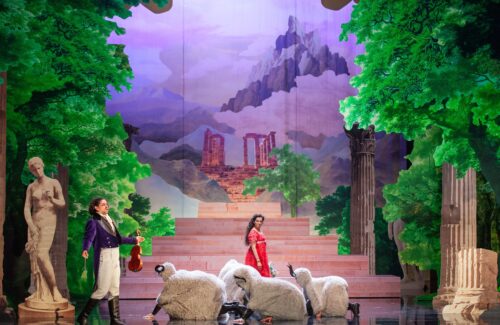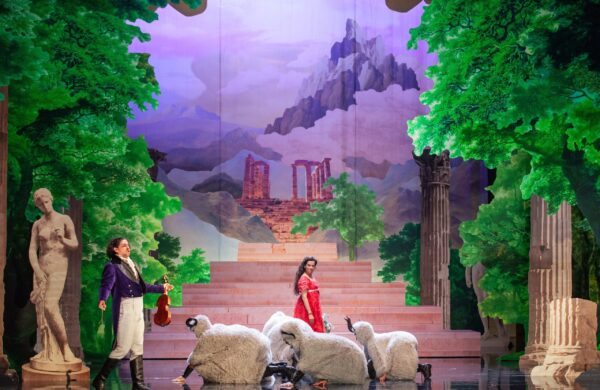 Netherlands Offenbach, Orphée aux enfers: Soloists, Chorus of Opera Zuid, Philharmonie Zuidnederland / Enrico Delamboye (conductor). Flint Theatre, Amersfoort, 6.6.2023. (LV)
Netherlands Offenbach, Orphée aux enfers: Soloists, Chorus of Opera Zuid, Philharmonie Zuidnederland / Enrico Delamboye (conductor). Flint Theatre, Amersfoort, 6.6.2023. (LV)

Production:
Director – Benjamin Prins
Design – Neil Marloes en Wikke and Marrit van der Burgt
Lighting – Julian Maiwald
Choreography – Willy Laury
Cast:
Eurydice – Amel Brahim-Djelloul
Pluton – Mark Omvle
Jupiter – Roger Smeets
Junon – Francis van Broekhuizen
Orphée – Mathys Lagier
Bacchus / Opinion Publique – Thomas Morris
Mercure – Jeroen de Vaal
Diane – Anna Emelianova
John Styx – Olivier Hernandez
Vénus – Marina Ruiz
Cupidon – Sophie Collin
Apollon – Tom Jansen
The word on the street in France is that authentic Offenbach – i.e. most deliriously nihilistic – is likely to be found in the south, in Marseille. What a happy surprise to find that a thousand kilometers north an opera company, based in Maastricht, the Netherland’s south, has been touring a production of Orphée aux enfers that is as maniacally silly and wonderfully romantic as anything you could imagine coming from the Dutch – or even the French.
At the helm again after the company’s success with Fantasio in 2019, director Benjamin Prins described the music ‘as vulnerable as a bubble and extremely extravagant’. Using imaginative stagecraft, including floating chess pieces and other found objects, and putting the chorus in the balcony at one point, he kept the setting at the Athenian Acropolis but veered occasionally into future centuries including an appearance by Offenbach himself. The musical ‘version mixte’ that Prins and conductor Enrico Delamboye concocted was based on the 1858 and 1874 versions, and the production was assembled to fit into venues from the Parktheater in Eindhoven to the Opera op de Parade in ’s-Hertogenbosch, where Orphée will end its run on 22 June.
It was the company’s first appearance at the Flint in the beautiful city of Amersfoort, and the fun began after the Overture when Thomas Morris’s pugnacious Public Opinion rose from the first row in the audience. Looking like Dustin Hoffman’s Tootsie, Morris chatted to the conductor and friends – ‘Martine, ça va?’ – before reaching a stage populated by five extremely amorous sheep who later would go off in paroxysms of baas while Orphée was busy with his own dirty dancing.
The cast was wonderful from top to bottom, with flashes of unpredictable chemistry. Amel Brahim-Djelloul’s Eurydice flirted deliciously with Mark Omvlee’s commanding Pluton and Mathys Lagier’s egotistical Orphée, and sailed brilliantly through her great arias, while Morris scored as Bacchus as much as with Public Opinion. Only Marina Ruiz’s Vénus, acting exquisitely while carrying a mirror to check her beauty, and Jeroen de Vaal’s otherwise engaging Mercure, struggled to be heard – and during his famous ‘Eh hop! Eh hop!’ the orchestra took such delight that no one could reasonably complain. Sophie Collin’s Cupidon in diapers almost stole the show, and Roger Smeets’s perplexed Jupiter with his stage prop of a lightning bolt was the night’s final and best absurdity.
Energized by musical intrusions that included Mendelssohn’s Violin Concerto, La Marseillaise and Love Me Tender – all absurdly perfect considering Offenbach’s own use of Gluck’s ‘Che farò senza Euridice’ – the entire cast was dancing by the end with some glorious singing by Eurydice and Orphée. The finale came amidst explosions of golden confetti.
The five-person corps de ballet added a sexy French snap of its own throughout the night, whether it was their opening ballet parodying Swan Lake or their embracing Eurydice in the guise of Cerberus’s three heads. Their chaotic take on the iconic galop was a welcome change from a clichéd can-can.
In the pit, the excellent Philharmonie Zuidnederland was tuned in from the start, 46 players strong – probably more than Offenbach’s orchestra at the Théâtre des Bouffes-Parisiens had at the opening but in line with today’s bigger theatres. They had the right sound for Offenbach, including a characteristically French clarinet vibrato, and expertly balanced with the singers and chorus so that not one delectable instrumental morsel was dropped off the table: an acoustic miracle.
Next season, Opera Zuid will take on Mozart’s Der Schauspieldirektor and a Rossini double bill of La Scala di Seta and Il Signor Bruschino. It should be a riot.
Laurence Vittes
